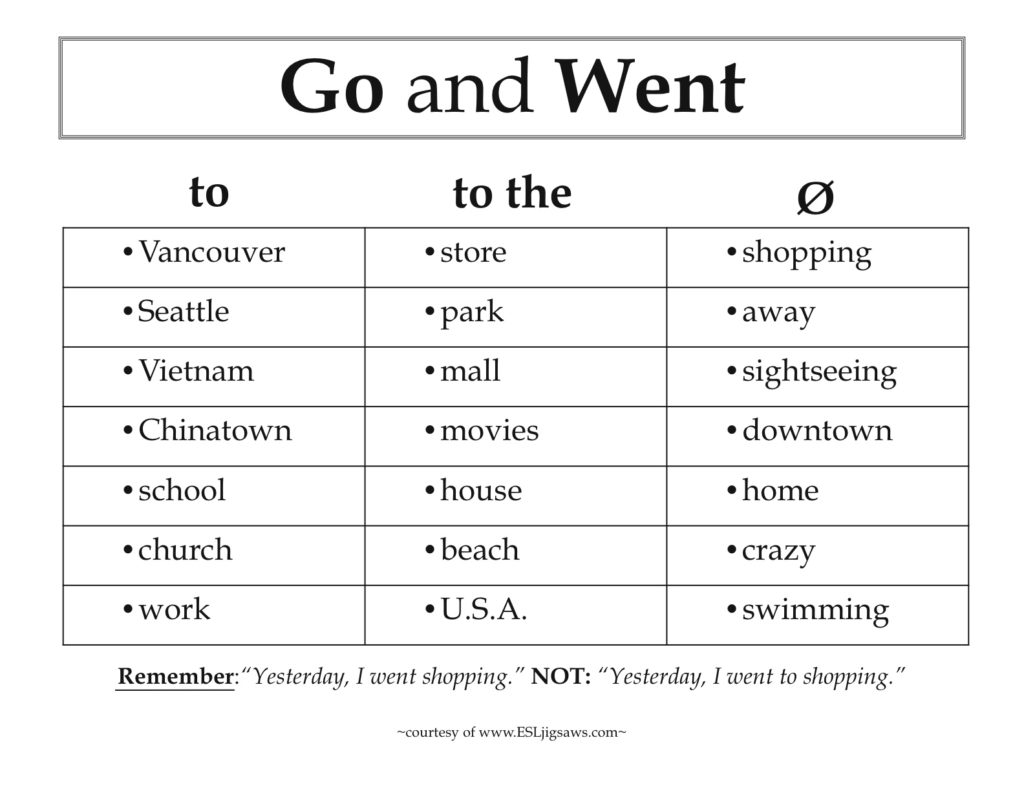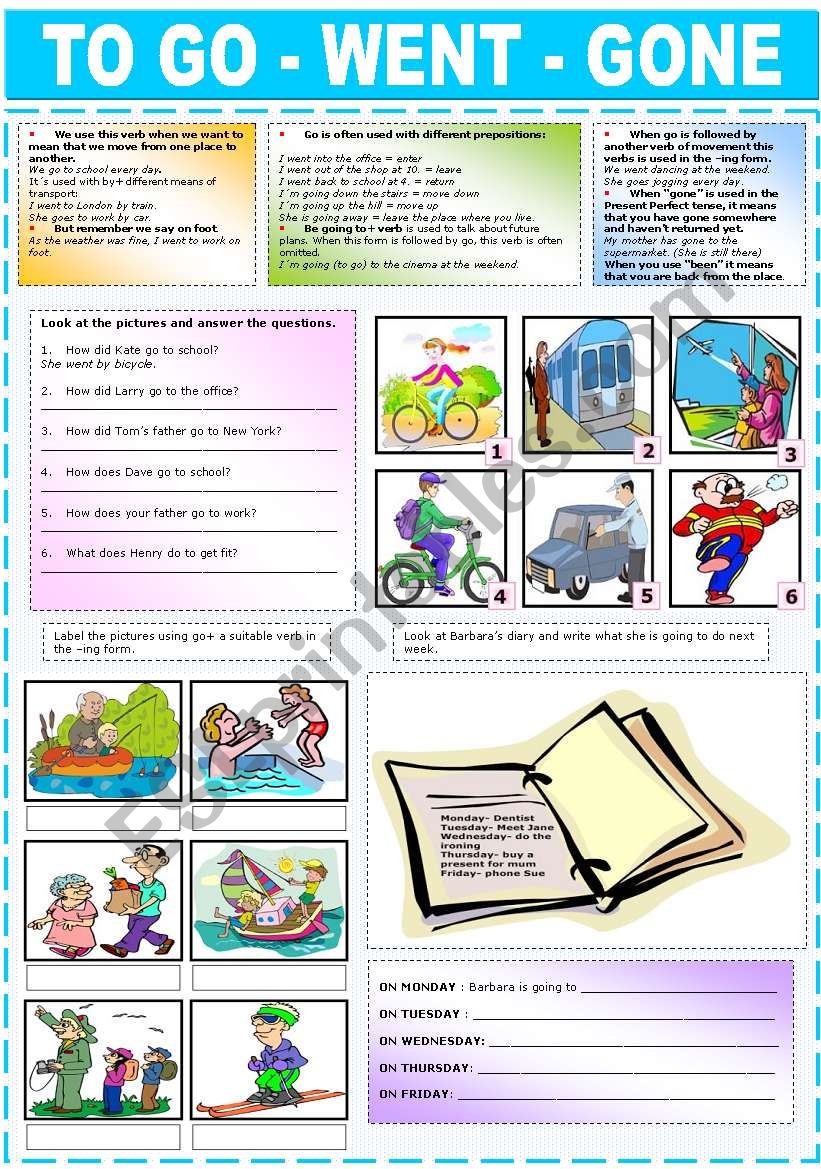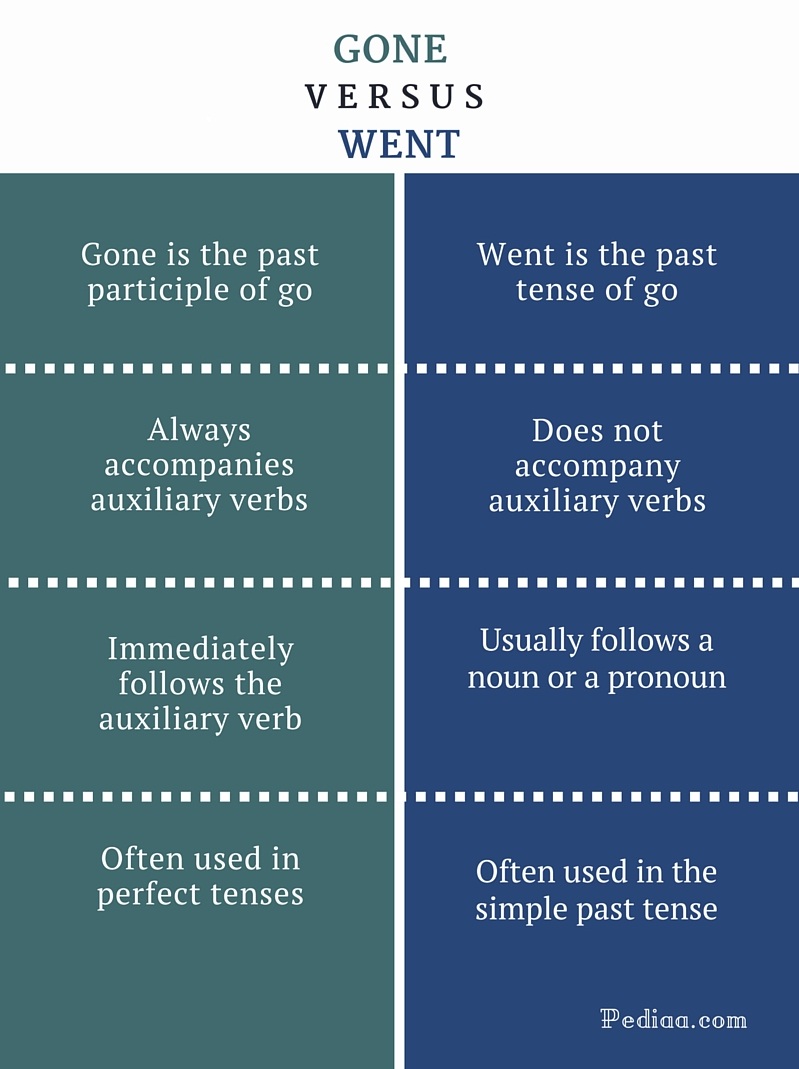
Past Tense Of Go, Past Participle Form of Go, Go Went Gone V1 V2 V3 Past Tense of Go The verb
Table of irregular verbs - English Grammar Today - a reference to written and spoken English grammar and usage - Cambridge Dictionary

Go Verb Forms Past Tense & Past Participle »
Conjugation of the verb Go in all tenses: future, present and past. 🎮 Conjugation trainer for memorizing forms.. go: went: gone: going [ɡəʊ] [went] [ɡɔːn] [ˈɡəʊɪŋ] [ɡəʊ] [ˈwent] [ɡɒn] [ˈɡəʊɪŋ] Trainer Settings. Break into pronouns . Shuffle cards . Nominal forms . Past Simple Past Participle Gerund.

Go, Goes, Going, Went or Gone? How To Properly Use This English Verb Justlearn
12 Basic Form of Tenses with Examples 1. Present Simple Tense Formula: Sub+V1+s/es+Obj Positive: He plays cricket. Negative: He does not play cricket. Question: Does he play cricket? Examples I polish my shoes. He combs his hair. She feeds her dog. We feel Hungry. They fight with friends. You bring a book. It takes two minutes.

When to Use “to” with Go and Went ESL Jigsaws
Conjugation verb go X English Conjugate Toolbox: Models British vs. American English Auxiliaries, modals Irregular verbs go walk; turn; pass;. Infinitive to go Preterite went Past participle gone Model : go Auxiliary : have, be Other forms: not go Contractions Advertising Indicative Present I go you go he/she/it goes we go you go they go

Common Errors in Spoken English Go, Goes, Going, Went or Gone? learn English,mistakes,misused
1. I want to home. 2. Nowadays, Jack to football on Saturdays. 3. Last week, Janet to Paris with Simon. 4. We have too far. 5. When are we to the river? "To Go" in All the Tenses The tables below show how "go" conjugates in the past, present, and future tenses. Past Tenses Present Tenses Future Tenses Most Common Irregular Verbs

GO, WENT, GONE 🤔 What's the difference? Learn with examples YouTube
Even by the standards set by the English language it is irregular for a verb to change entirely from the present tense to the simple past tense. The verb go, and its simple past verb form, went, are completely different in terms of spelling and pronunciation. Still, went is the simple past tense of the present tense verb, to go.

TO GOWENTGONE ESL worksheet by Katiana
Permalink. The wind's gotten stronger. (present perfect) He hasn't gotten a job yet. (present perfect) I was a bit ill but I've gotten much better. (present perfect) I was tired because I hadn't gotten any sleep. (past perfect) Learn about irregular verbs like be, eat, get, know and wear and do the exercises to practise using them.

Irregular verbs list
What is the Past Tense of Go? The past tense of go is "went".. The past participle of go is "gone". Meaning of Go: To Go: To travel to a place. Example Sentences with Go: Peter would make the misery go away. About Go. The word "go" is a verb that means to move somewhere, typically with speed. It also refers to the act of starting.

Is it Went or Gone? What's the Past Tense of Go?
powered by LanguageTool Are you wondering what is the past tense and past participle of "go"? We can help. Is it "should have went " or "should have gone"? Find out below. Go is an irregular verb. I go bowling every Sunday. Went is the past tense of go. Last Sunday I went bowling. Gone is the past participle of go.

English irregular verbs the have regular trackingascse
Definitions And How To Use Went? The English verb fly has the following meanings: To move/travel from one place to another place. Example: I just saw her in the garden. She went to grandma's house. To move (with someone) to a particular place (party, meeting, etc.) Example: You went to Anne's party, didn't you?

Is it Went or Gone? What's the Past Tense of Go?
1Note: Compounds of irregular verbs have the same past and past participle forms as the basic verb. Examples: come came come Æ overcome overcame overcome go went gone Æ undergo underwent undergone set set set Æ upset upset upset Exception: welcome welcomed welcomed

Mastering English Grammar The Past Tense of Go Made Simple ESLBUZZ
The Role of Went in Expressing Completed Actions As the simple past tense form of "go," "went" is used to describe actions that have been fully completed in the past. It functions without the need for an auxiliary verb, which distinguishes it from other verb forms. Some examples of "went" usage include: "She went home an hour ago."

Difference Between Gone and Went Learn English Grammar Online
"Gone" is a past participle, typically used in perfect tenses with "have," "has," or "had." It implies that an action is completed or a state is no longer present. "Went," on the other hand, is the simple past tense of "go," indicating an action that happened in the past but does not specify completion.

How to use the verb ‘to go’ Grammar Tips
go - went - gone Table of the most common irregular verbs * regular form (+ -ed) also possible. The trend, in English, and especially in American English, is to standardize the irregular verbs.

Go Went Gone … Urggg! Subject and verb, How to memorize things, Run on sentences
Conclusion. Remember that "go" has two principal past tense forms: "went" and "gone.". We use "went" for simple past actions and "gone" with auxiliary verbs to form perfect tenses. Knowing when to use each form will enhance your English grammar skills and make your writing more precise.

Go Going Went Missing Word Worksheet by Teach Simple
Irregular Verb Chart: Irregular Verbs Most verbs are REGULAR: they form their past tense and past participle by adding -d or -ed to the plain form—live, lived, lived. About two hundred English verbs are IRREGULAR: they form their past tense and past participle in some irregular way—break, broke, broken.